Edward Lyttleton Fox (born 1958 in New York [ citation needed ]), resident in London, is a writer from the United States. [1]
Edward Lyttleton Fox (born 1958 in New York [ citation needed ]), resident in London, is a writer from the United States. [1]
Edward Fox is the author of three books:
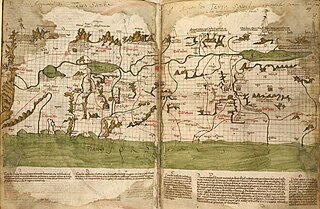
The Holy Land is an area roughly located between the Mediterranean Sea and the eastern bank of the Jordan River, traditionally synonymous both with the biblical Land of Israel and with the region of Palestine. Today, the term "Holy Land" usually refers to a territory roughly corresponding to the modern states of Israel and Palestine. Jews, Christians, Muslims, and Baháʼís regard it as holy.
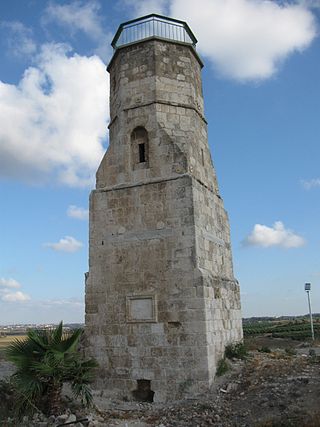
Yibna, or Tel Yavne, is an archaeological site and depopulated Palestinian town. The ruins are located southeast of the modern Israeli city of Yavne.

Biblical archaeology is an academic school and a subset of Biblical studies and Levantine archaeology. Biblical archaeology studies archaeological sites from the Ancient Near East and especially the Holy Land, from biblical times.

Biblical inspiration is the doctrine in Christian theology that the human writers and canonizers of the Bible were led by God with the result that their writings may be designated in some sense the word of God. This belief is traditionally associated with concepts of the biblical infallibility and the internal consistency of the Bible.
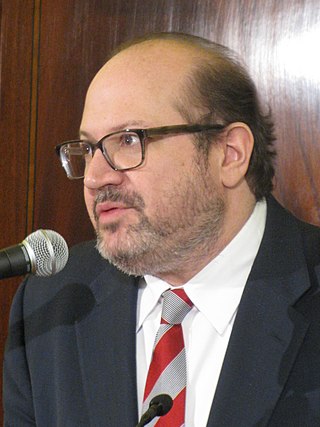
Sam Lipsyte is an American novelist and short story writer.
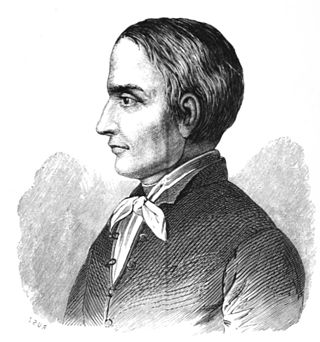
Sándor Csoma de Kőrös was a Hungarian philologist and Orientalist, author of the first Tibetan–English dictionary and grammar book. He was called Phyi-glin-gi-grwa-pa in Tibetan, meaning "the foreign pupil", and was declared a bosatsu or bodhisattva by the Japanese in 1933. He was born in Kőrös, Grand Principality of Transylvania. His birth date is often given as 4 April, although this is actually his baptism day and the year of his birth is debated by some authors who put it at 1787 or 1788 rather than 1784. The Magyar ethnic group, the Székelys, to which he belonged believed that they were derived from a branch of Attila's Huns who had settled in Transylvania in the fifth century. Hoping to study the claim and to find the place of origin of the Székelys and the Magyars by studying language kinship, he set off to Asia in 1820 and spent his lifetime studying the Tibetan language and Buddhist philosophy. Csoma de Kőrös is considered as the founder of Tibetology. He was said to have been able to read in seventeen languages. He died in Darjeeling while attempting to make a trip to Lhasa in 1842 and a memorial was erected in his honour by the Asiatic Society of Bengal.
Criticism of the Bible refers to a variety of criticisms of the Bible, the collection of religious texts held to be sacred by Christianity, Judaism, Samaritanism, and other Abrahamic religions. Criticisms of the Bible often concern the text’s factual accuracy, moral tenability, and supposed inerrancy claimed by biblical literalists. There remain questions of biblical authorship and what material to include in the biblical canon.

Edward Robinson was an American biblical scholar known for his magnum opus, Biblical Researches in Palestine, the first major work in biblical geography and biblical archaeology, which earned him the epithets "Father of Biblical Geography" and "Founder of Modern Palestinology."
David Gibbins is an underwater archaeologist and a bestselling novelist.
This article lists historical urban community sizes based on the estimated populations of selected human settlements from 7000 BC – AD 1875, organized by archaeological periods.
Albert E. Glock was an American archaeologist working in Palestine, where he was murdered.
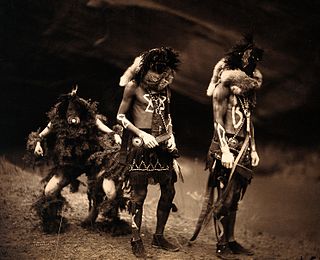
Native American religions, Native American faith or American Indian religions are the indigenous spiritual practices of the Indigenous peoples of the Americas. Ceremonial ways can vary widely and are based on the differing histories and beliefs of individual nations, tribes and bands. Early European explorers describe individual Native American tribes and even small bands as each having their own religious practices. Theology may be monotheistic, polytheistic, henotheistic, animistic, shamanistic, pantheistic or any combination thereof, among others. Traditional beliefs are usually passed down in the oral tradition forms of myths, oral histories, stories, allegories, and principles. Nowadays, as scholars note, many American Natives renew their interest in own tradition.
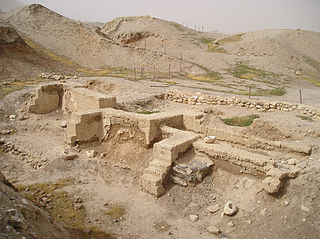
Levantine archaeology is the archaeological study of the Levant. It is also known as Syro-Palestinian archaeology or Palestinian archaeology. Besides its importance to the discipline of Biblical archaeology, the Levant is highly important when forming an understanding of the history of the earliest peoples of the Stone Age.

The Macmillan Bible Atlas is a book on the geography, civilizations and cartography of the Holy Land. It describes the movements of biblical characters, trade routes and battles. It also refers to archaeological excavations; illustrations of artifacts; and a comparative chronology of early civilizations that relate to the Bible.
Macmillan Inc. was an American book publishing company originally established as the American division of the British Macmillan Publishers. The two were later separated and acquired by other companies, with the remnants of the original American division of Macmillan present in McGraw-Hill Education's Macmillan/McGraw-Hill textbooks, Gale's Macmillan Reference USA division, and some trade imprints of Simon & Schuster that were transferred when both companies were owned by Paramount Communications.
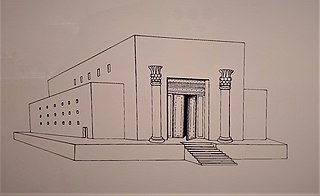
Solomon's Temple, also known as the First Temple, was a biblical Temple in Jerusalem believed to have existed between the 10th and 6th centuries BCE. Its description is largely based on narratives in the Hebrew Bible, in which it was commissioned by biblical king Solomon before being destroyed during the Siege of Jerusalem by Nebuchadnezzar II of the Neo-Babylonian Empire in 587 BCE. No remains of the destroyed temple have ever been found. Most modern scholars agree that the First Temple existed on the Temple Mount in Jerusalem by the time of the Babylonian siege, and there is significant debate among scholars over the date of its construction and the identity of its builder.

Travelogues of Palestine are the written descriptions of the region of Palestine by travellers, particularly prior to the 20th century. The works are important sources in the study of the history of Palestine and of Israel. Surveys of the geographical literature on Palestine were published by Edward Robinson in 1841, Titus Tobler in 1867 and subsequently by Reinhold Röhricht in 1890. Röhricht catalogued 177 works between 333 and 1300 CE, 19 works in the 14th century, 279 works in the 15th century, 333 works in the 16th century, 390 works in the 17th century, 318 works in the 18th century and 1,915 works in the 19th century.
The Book of Joshua lists almost 400 ancient Levantine city names which refer to over 300 distinct locations in Israel, the West Bank, Jordan, Lebanon and Syria. Each of those cities, with minor exceptions is placed in one of the 12 regions, according to the tribes of Israel and in most cases additional details like neighbouring towns or geographical landmarks are provided. It has been serving as one of the primary sources for identifying and locating a number of Middle Bronze to Iron Age Levantine cities mentioned in ancient Egyptian and Canaanite documents, most notably in the Amarna correspondence.

The PEF Survey of Palestine was a series of surveys carried out by the Palestine Exploration Fund (PEF) between 1872 and 1877 for the completed Survey of Western Palestine (SWP) and in 1880 for the soon abandoned Survey of Eastern Palestine. The survey was carried out after the success of the Ordnance Survey of Jerusalem by the newly-founded PEF, with support from the War Office. Twenty-six sheets were produced for "Western Palestine" and one sheet for "Eastern Palestine". It was the first fully scientific mapping of Palestine.